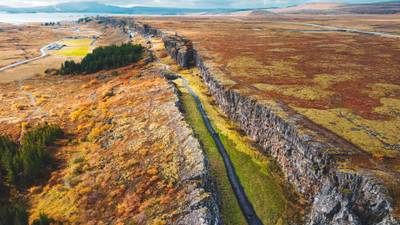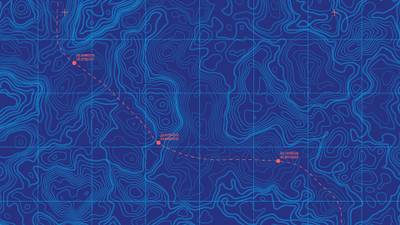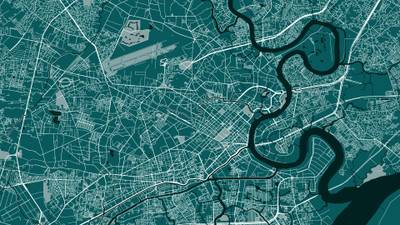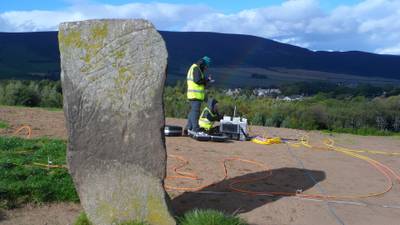Develop the skills to lead sustainable change.
Sustainable development – balancing environmental, economic, and social goals – is humanity’s greatest challenge.
We lack leaders equipped to drive the critical transitions from fossil fuels to renewables and implement reforms across sectors and regions.
This Masters-level online course is designed to help train future sustainability leaders.
Study sustainability transitions online
In this flexible online course, you’ll learn about:
- the evolution of sustainability concepts
- political, economic, technological, and social barriers to sustainability transitions
- approaching these challenges critically to develop innovative solutions.
Who can join this online sustainability transitions course?
This course is designed for:
- graduates looking to pursue a career in the broad area of sustainability
- professionals already in the field who wish to enhance their knowledge and expertise
- professionals from any sector looking for a career change into this area.
Sustainability transition experts
With our Centre for Energy Transition and the Just Transition Lab, we’re leading interdisciplinary research and training to support the UK’s transition to a green economy.

Build credits towards a Masters degree
This online short course is part of our planned online MSc in Sustainability Transitions.
The credits you earn with this short course will count towards online MSc Sustainability Transitions when it launches in September 2026.
What you’ll study
In this online course, you’ll examine how the idea of sustainability has developed over time, including its history and the theories behind it.
You’ll explore academic material on the topic, and learn to think critically about the challenges to sustainable transitions, including their origins.
Alongside the challenges, we’ll actively investigate and discuss solutions. You’ll learn to think creatively to identify a range of possible solutions.
You’ll cover topics including:
- the interdisciplinary nature of sustainability transitions
- technological, political, institutional, economic, and socio-cultural challenges to successful sustainability transitions
- related concepts such as sustainable development, green growth, and the green economy.
As well as covering academic literature, we’ll also use grey literature and policy and media reports in order to help you link the theory to successful and unsuccessful real-world examples.
By the end of this course, you’ll be able to...
-
Demonstrate an advanced understanding of the theoretical evolution of the notion of sustainability and related concepts, including sustainable development, green growth, and the green economy.
-
Analyse the key physical and societal drivers of environmental challenges, from a local to a global scale.
-
Evaluate scientific, policy, and management approaches used to help resolve some current environmental issues.
Choose the University of Aberdeen for flexible online short courses

Learn anywhere
On smartphone, desktop and laptop, with no need for a student visa.

Flexible
Flexible hours and 24/7 access, so you can study when it suits you.

20% alumni discount
University of Aberdeen alumni get 20% off fees for this online course.
How you’ll study
Online learning
This distance-learning Sustainability Transitions course is delivered flexibly, 100% online.
You can learn with us anywhere in the world, no student visa required, and manage your study hours to suit you.
Your teaching
This course is taught at Masters level.
Teaching is delivered through MyAberdeen, our online Virtual Learning Environment (VLE). It holds all the materials, tools and support you’ll need in your studies. Take a look around MyAberdeen.
You can access your learning materials on computer, smartphone and laptop, 24 hours a day. You’ll find a range of resources available, including:
- pre-recorded video lectures
- live online sessions
- online 3D virtual outcrops
- reading materials
- discussion boards with your tutors and peers
- the online resources of our award-winning Sir Duncan Rice Library.
Live online sessions
This course features two live online sessions and one live online seminar, which is linked to one of your assignments.
Your tutors
This online short course is delivered by our Department of Geography and Environment, within the School of Geosciences.
You’ll learn from a team of experienced academics and invited guest speakers.
This course is assessed online.
You’ll be assessed via:
- an individual essay, 2500 words (worth 60% of your final course grade)
- a 15-minute group presentation (40%).
Recorded lectures
All lectures are recorded and accessible 24/7 so you can watch them at a time that suits you, and you can pause and re-wind to ensure understanding and take notes. You can access and work through the course at your convenience.
Live online sessions
This course features two live interactive sessions. Each session is scheduled to last one hour. Session dates and times will be organised at the start of the course. Your course coordinator will consider everyone’s circumstances and time zones before setting up live session times that best suit the class.
Live online seminar
The course will include one 3-hour presentation seminar where groups of students will deliver their presentations (assignment 2). Your course coordinator will consider everyone’s circumstances and time zones before setting up a seminar time that best suits the class.
Discussion boards
Each lecture topic will have an associated discussion board where you will be welcomed to share your comments and views and respond to fellow students’ comments in writing. It is estimated that participation in each discussion board will take one hour per person in total.
Study hours
This course totals approximately 150 hours of study and assessment time. That’s around 10 – 15 hours per week.
This is an indicative guide to the time required for a typical student at this level to achieve the learning outcomes. This includes time for independent study, as well as teaching and assessments.
You can largely set your own study hours each week to cover the materials. MyAberdeen is available 24/7, so you can log in and study when it suits you.
Our first-class support structure will ensure that you aren’t alone in your studies. You’ll have contact with your coordinator via email, MyAberdeen and Microsoft Teams. You can use social media and discussion boards to chat with your fellow students too.
We provide a wide range of services to support you in your studies and beyond:
- Careers and Employability Service
- Disability support
- IT support
- Library support
- Student Support Service – help with finances, wellbeing, and non-academic issues
- Student Learning Service – study skills support and advice
- Aberdeen University Students’ Association (AUSA) – run by students for students
- Toolkit – clever apps and free training that can make your study life easier
Wherever you are in the world, you’ll feel part of our very special Aberdeen learning community.
Your course coordinator
Dr Piotr Niewiadomski
Piotr is a Senior Lecturer in Human Geography at the University of Aberdeen.
He leads our MSc in Sustainability Transitions.
Piotr’s research interests include sustainability transitions, the international tourism production system, sustainability in tourism, and post-communist transformations in Central and Eastern Europe (CEE).
View Piotr’s profileWhere this will take you
On successful completion of this course and assessments, you’ll earn 15 credits at Masters level (SCQF Level 11).
These credits can count towards further study and will count towards online MSc Sustainability Transitions when it launches in September 2026.
Careers
Whatever your sector, this course will help you to develop the skills, knowledge, and passion to make the world a more sustainable place.
Designed with input from key organisations, the course offers practical application across government, industry, non-governmental organisations (NGOs), and business worldwide.
This course is valuable learning for:
- graduates looking to progress their studies in sustainability to postgraduate level
- professionals who wish to gain knowledge on the contemporary sustainability agenda in order to extend and complement their existing expertise in their current roles
- professionals looking for a pathway into careers in sustainability.
Continuing Professional Development (CPD)
Your employer or professional institute may recognise this course for CPD hours. Talk to your employer or institute to find out more.

Free career support
Access our free careers service while you study.
- 1:1 appointments
- CV checks
- Interview prep
- Job opportunities
Entry requirements
Entry requirements
We welcome students from all over the world.
This course has no formal entry requirements. You do not need to provide proof of your qualifications.
But you do need to check the entry guidance above to understand the level of teaching delivered, to decide if this course is right for you.
If you do not have qualifications from the UK, check the equivalent teaching level for your country.
Visa requirements
You do not need a student visa to study online with us.
English language requirements
Teaching is delivered in English.
You do not have to provide proof of your English language skills to join this course. But we want to make sure that you can use English well enough to study successfully.
Recommended level of English
For this course, we recommend the following level of English language proficiency.
These are our Postgraduate Standard requirements, and these are minimum scores.
IELTS Academic, IELTS UKVI Academic, or IELTS Online (not IELTS Indicator or IELTS General Training)
- 6.5 overall
- 5.5 for listening, reading and speaking
- 6.0 for writing
TOEFL iBT or TOEFL iBT Home Edition
- 90 overall
- 17 for listening
- 18 for reading
- 20 for speaking
- 21 for writing
- TOEFL DI code is 0818
Cambridge English: B2 First, C1 Advanced, or C2 Proficiency
- 176 overall
- 162 for listening, reading and speaking
- 169 for writing
LanguageCert Academic / LanguageCert Academic SELT
- 70 overall
- 60 for listening, reading and speaking
- 65 for writing
Oxford ELLT Digital – English Language Level Test Online
- 7.0 overall
- 5.0 for listening, reading and speaking
- 6.0 for writing
PTE Academic (online test not accepted)
- 62 overall
- 59 for listening, reading, speaking and writing
Skills for English: SELT
- B2 pass with merit
Duolingo – tests taken from 1 July 2024 onward
- 120 overall
- 95 for listening, reading and speaking
- 105 for writing
University of Aberdeen English Pre-sessional Programme (PSE)
- Pass
- Valid for one year. Refresher can be offered if out of date
Pre-sessional academic English preparation programmes undertaken at other UK universities
- Pass at an equivalent of 6.5 (C1)
- B2 in all four skills
- Certification must be within one year prior to the start of your course
For full information about language requirements, see our English Language Requirements page.
You will need access to:
A computer (PC, laptop or Mac) with an up-to-date operating system
Most teaching materials are smartphone- and tablet-friendly. But we recommend a proper laptop or desktop for completing assignments comfortably.
Reliable internet access
We recommend:
- a wired connection
- a minimum download speed of 2 Mbps so you can take part fully in live sessions.
Speakers or headphones
- We recommend a headset with built-in microphone and earphones if you’re likely to study in an environment with background noise.
- A webcam is optional, but you may like to use one for some interactive sessions.
Software
We’ll give you access to Office365 applications. This means you can use online versions of Microsoft Word, Excel, PowerPoint and OneDrive and install these programs on up to five personal devices.
If your course requires specialist software, we’ll provide you with access to this and a licence that lasts throughout your studies.
See our detailed IT requirements for more information.
When you study with us, you can expect a first-class support structure so that you’re never alone in your studies.
But learning online does mean you have to motivate yourself and manage your own time.
Your most important commitment will be time – the time to work through, reflect on and understand your teaching materials.
Before you start a course that involves a high degree of independent study, we recommend looking at the time you will be able to devote to your studies each week:
- Be realistic
- Create a weekly schedule as a guide
If you have any questions about studying online, get in touch with our friendly team. We’re here to help.
Fee payment
Your course fee needs to be paid in full before you start your course.
We accept payment via Visa Debit, Visa Credit and Mastercard.
Ways to save
You may be able to get help funding this course via:
- discounts – if any discounts are available for this course, they’ll appear in the section below
- employer sponsorship – we accept full and partial fee payments from sponsors.
Find out more about funding options.
Student card
All our students are entitled to a University of Aberdeen student card. This gives you access to a range of student discounts around the city and online.
Learning resources
Access to all the books and resources you need are included in your tuition fee. They’ll be made available to you online and you do not have to buy your own copies.
Printing
You may wish to set aside a small budget for printing, depending on how you like to work.
This course has no formal entry requirements. You decide if it’s suitable for you.
The course is delivered at Masters level. At this level, you’d usually have at least:
- a 2:2 UK honours degree (or equivalent) in a relevant subject, or
- relevant professional experience that supports this level of learning.















